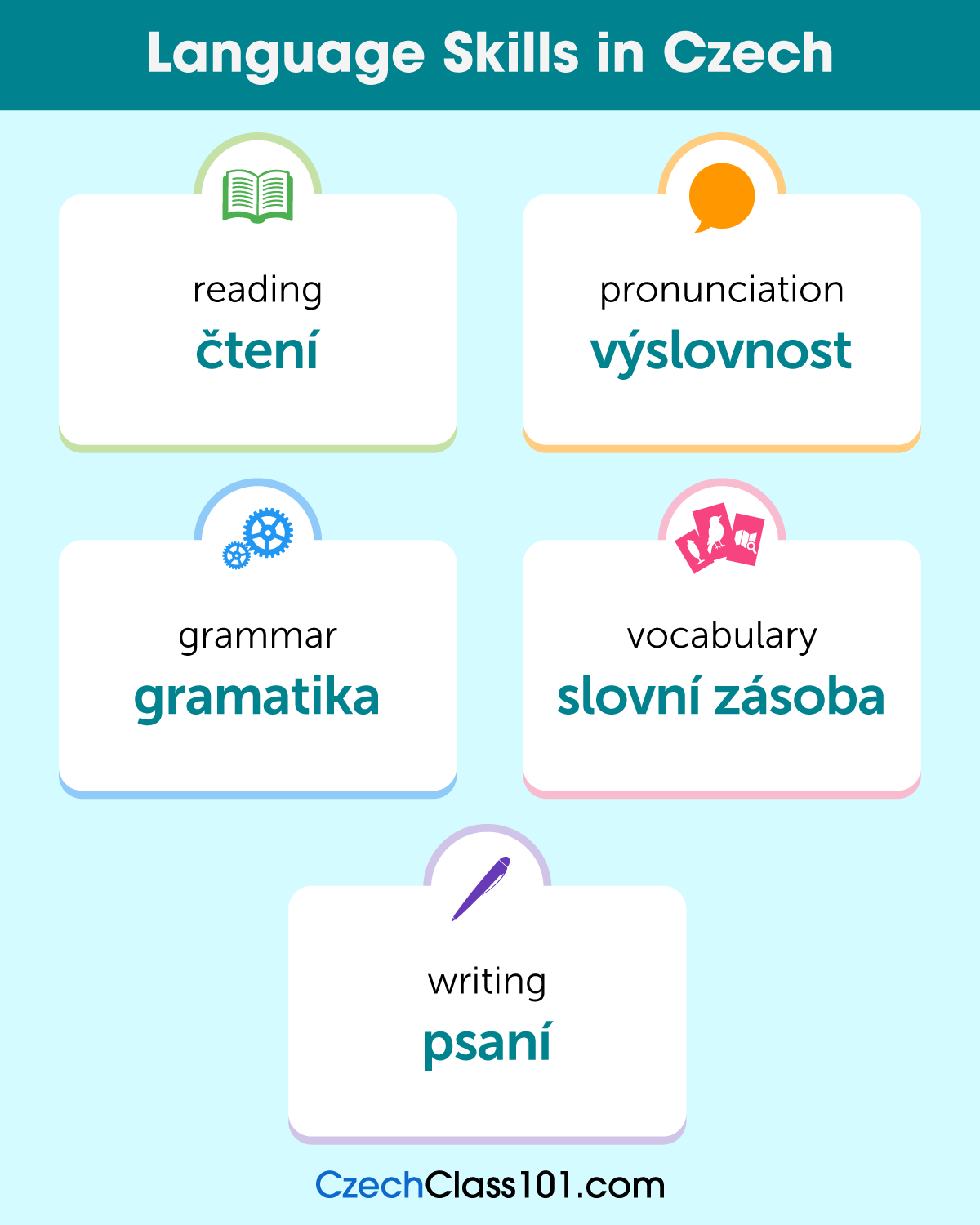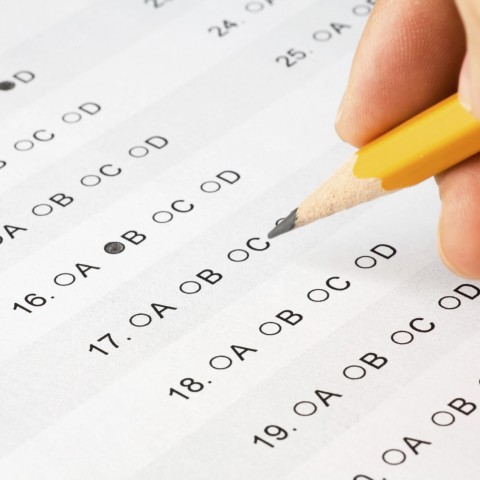
Taking a Czech language test or exam is a decision that might change your entire life.
Let’s get a bit touchy-feely and personal, shall we?
My long story short: “Oh, maybe I want to be a translator or something, what do I do? Okay, apparently I need a certificate…when’s the next exam date? In a few weeks? Cool! Erm… How am I supposed to learn all this stuff in three weeks?” -> Daily panic attacks and lots of crying in the shower (figuratively speaking). -> Passed the exam. -> Works as a freelance translator and writer, currently sitting on a couch thousands of miles away from home, and writing an article on how to pass a Czech language test.
See? It’s doable, even if you don’t have the time (or money) for a specialized prep course.
A language exam is not as bad as it might seem. First of all, it’s just a Czech test. You’re not putting your pet’s life at risk, the world won’t stop spinning, your mom will love you no matter what, and there will be lots of new Marvel movies—no matter the result.
Of course, you want to pass. And maybe your ambitions are even higher. Maybe you want to ROCK! You don’t need a magic pill or superpowers. You just need to study, keep positive, and believe in yourself.
In this guide, we’ll explain everything you need to know for smooth sailing: Where to apply, how to prepare for the Czech Language Certificate Exam (CCE), and how to ace your test without losing faith in life.

Nail your CCE with CzechClass101!
 Table of Contents
Table of Contents
- Who Should Take it and How to Apply
- A Closer Look at the Czech Language Certificate Exam
- Top 10 Tips for Preparing for Your Czech Language Test
- How CzechClass101.com Helps You Prepare for Your Czech Language Certificate Exam
1. Who Should Take it and How to Apply
The Czech Language Certificate Exam (CCE) was developed by the Institute for Language and Preparatory Studies of Charles University in Prague. If you’re a non-EU citizen applying for a permanent residence, you’re going to have to go through this, friend. Thus, it’s sometimes called the “Czech citizenship test.”
To pass, your communication skills must reach the required B1 language proficiency level under the Common European Framework of Reference for Languages (CEFR).
You might want to consider getting the certificate even if you’re not after a permanent residence in the Czech Republic. Some employers might want to see proof of your language proficiency, too. Speaking from personal experience, Czech employers love certificates and diplomas the way that businesses in English-speaking countries adore references.
Last but not least: a CCE certificate might also help you with the university application process if you’re looking to study in the Czech Republic.
Not sure if you need to put yourself through this? Check out the Ministry of the Czech Republic website.

A- CCE Test Registration
Yay for modern technology!
You can register online. Just fill out an application form on the ILPS CU website and submit.
It’s possible to take the CCE exam in the Czech Republic (Prague and Brno), and in more than fifteen other countries around the world.
- ➢ You’ll need to enroll at least three weeks before the exam (or by the date set by the foreign examination center if you’re going to take the exam abroad).
➢ You’ll also need to pay the fee two weeks before your exam date.
➢ You can select your exam venue and date in the application form.
For a complete list of countries and fees, check out this section of the official website.
B- Exam Structure
The CCE exam tests your reading comprehension, listening comprehension, and writing skills. The oral part of the exam tests your speaking abilities.
The CCE exam has five parts:
1. Reading Comprehension
2. Listening Comprehension
3. Grammar/Lexical Text
4. Writing
5. Speaking
You can find more info on the official website.

For the speaking part, you work in pairs. During the tests—you’re on your own, buddy.
C- Levels of Proficiency
The CCE has five levels of Czech proficiency, corresponding with those of the Common European Framework of Reference for Languages (CEFR):
CCE–A1: Beginner. This exam tests your ability to understand and use basic expressions and phrases (you’re able to introduce yourself and interact in the Czech language at a slow pace).
CCE–A2: Lower-intermediate. At this level, you can understand more-complex sentences and frequently used expressions and phrases. You’re also able to communicate and describe things using simple terms.
CCE–B1: Intermediate level. You’re able to communicate, as well as describe events and experiences in Czech.
CCE–B2: Upper-intermediate. You’re a “confident Czech speaker.” You’re able to understand more-complex content related to your field and speak Czech without any huge effort or preparation.
CCE–C1: Advanced. Longer and complex interactions are a piece of cake for you. You’re able to use Czech for social, academic, or professional situations.
- ➢ The Czech CCE–B2 and CCE–C1 exams are recognized for demonstrating the language skills of individuals applying for employment in the Czech Republic.
- ➢ At each of the five proficiency levels, the Czech Language Certificate Exam tests candidates’ communicative proficiency with the criteria stated in the CEFR.
D- Results: Did I Pass?
The results for your CCE exam will be posted online within thirty days. The certificate will be mailed to you within seven weeks following your exam.
- ➢ In order to pass, you need to get a score of at least 60% overall AND at least 60% in each of the five parts.
2. A Closer Look at the Czech Language Certificate Exam
In the following sections, I’ll outline what you can expect to see in each part of this Czech language proficiency test.
A- Introduction to the Listening Section
| Proficiency | Time | Tasks |
| A1 | 20-25 minutes | 4 tasks in totalMultiple-choiceMatching |
| A2 | 20-25 minutes | 4 tasks in totalTrue/FalseMultiple-choiceMatching |
| B1 | 35-40 minutes | 4 tasks in totalMatchingMultiple-choiceTrue/False |
| B2 | 40-45 minutes | 4 tasks in totalMatchingMultiple-choiceTrue/False |
| C1 | 50-55 minutes | 4 tasks in totalMatchingMultiple matchingMultiple-choiceTrue/False |
- ➢ The audio is played twice.
Listening is often the most dreaded part of the Czech language test, and listening comprehension is considered the hardest skill to develop.
How can you be sure to pass this part of the test, then?

Practice active listening daily!
Nail It!
Before the Exam:
- Prepare. People often recommend listening to or watching movies in your target language (with or without subtitles). However, passive listening isn’t enough, and it won’t get you anywhere. You need to LISTEN. Put a movie/podcast/YouTube video on, grab a piece of paper, and focus. Twenty minutes a day will make a huge difference.
- Start with a topic that you’re interested in. This can be anything you like—watch make-up tutorials on YouTube if that’s your thing; watch fishing videos, cooking shows…you need to be engaged.
- Start with audio/video that’s quite easy for you to understand. After a few days, move on to another level that’s a little bit above yours—this is very important. In order to make progress, you NEED to challenge yourself, regardless of whether you’re going to take the A1 or C1 Czech test level.
- Another great option is talking to native speakers (I can’t recommend this enough).
- Practice listening at slow, moderate, and fast speeds. Try this video for beginners (great for A1 and A2).
- Write down words, phrases, and idioms you don’t understand and memorize them.
During the Exam:
- Focus on the big picture and save details for later. Try to get a good grasp of the context and message the first time the audio is played. The second time, figure out the rest.
- Be alert. Don’t forget that you can’t rewind.
- Jot down notes. Write down the topic and core points (you can use your exam sheets for this).

B- Introduction to the Reading Section
| Proficiency | Time | Tasks |
| A1 | (+ Writing) 60 minutes | 6 tasks in total (10-80 words)2 writing tasks (20 and 20-30 words) |
| A2 | 45 minutes | 4 tasks in total (80-170 words)True/False and multiple-choice |
| B1 | 50 minutes | 4 tasks in totalTrue/False |
| B2 | 50 minutes | 4 tasks in totalTrue/FalseMatching |
| C1 | 60 minutes | 4 tasks in totalTrue/FalseMatchingMultiple matching |
Nail It!
Before the Exam:
- Remember that this isn’t just about reading—it’s about comprehension. Don’t focus on individual words and literal meanings; try to find the core message and emotions.
- Practice the timing. Your attention likely dwindles (or even disappears) after a certain amount of time. Try to push yourself by adding a couple of minutes every time you read.
- Work on your vocabulary (I’m gonna say this a lot, for a good reason!). Write down words you don’t know, and memorize them. You can use our Vocab Builder.
- Read articles, magazines, books, and subtitles. Try our Reading Lesson for Intermediate or Beginner Czech learners. We also have a great Reading Guide for ya.
During the Exam:
- Read the text first. Focus.
- After that, read the questions.
- If you get lost or confused, summarize what you’ve read so far. Skim through the text and look for the context.
- For the A1 Czech language test, you should spend no more than 35 minutes on the reading. Then, move on to the writing part (25 minutes).
C- Introduction to the Writing Section
| Proficiency | Time | Tasks |
| A1 | Included in the Reading Comprehension part | – |
| A2 | 40 minutes | 2 tasks |
| B1 | 60 minutes | 2 tasks |
| B2 | 80 minutes | 2 tasks |
| C1 | 90 minutes | 2 tasks |
Writing might be tricky for you. Trust me, at the time of my exam, I was a seasoned writer (with a degree in journalism), my English was okay, but the writing task was a pain for me. This is because I wasn’t used to writing by hand, and I didn’t spend enough time practicing.
Learn from my mistakes!
Nail It!
Before the Exam:
- Practice the timing. This is very important, and I wish I hadn’t slacked on this. Find a topic, hit the Start button or your stopwatch, and get to work.
- Read! This will help you get accustomed to various sentence structures, and improve your vocabulary and spelling.
- Learn proper punctuation. The punctuation in Czech and English is very different. You don’t want to lose points on periods and commas, do you?
Start with simple, short pieces. When you feel comfortable enough, move up to more complex texts. We have a great guide on How to Write 1000 Czech Words in 5 Minutes a Day that will help you get started. Check it out:
During the Exam:
- Read the instructions twice. I know way too many people who failed an exam just because they didn’t read (and follow) the guidelines.
- Start with an outline.
- Use as much vocabulary and grammar elements as you can. You want to show off—if you have it, flaunt it. But…
- …if you get super-nervous, keep your pieces short and coherent.
- Make sure you have enough time to review your work—five minutes should be enough. This is especially important if you’re taking the Czech B1 exam or higher.
D- Introduction to the Speaking Section
| Proficiency | Time | Tasks |
| A1 | 5-8 minutes (per person) | 2 tasksYour family, hobbies, where you’re fromAsking and giving information about institutions or events |
| A2 | 10-13 minutes (per pair) | 2 tasksYour family, hobbies, where you’re fromAsking and giving information about institutions or events |
| B1 | 15-18 minutes (per pair) | 3 tasksIntroduce yourself (2 minutes)The examiner asks questions (general topics, 3-4 minutes) + you’ll describe an imageThe candidates have to communicate and plan an event or trip |
| B2 | 18-21 minutes (per pair) | 3 tasksIntroduce yourself (3 minutes)The examiner asks questions (general topics, 3-4 minutes) + you’ll describe an imageThe candidates have to communicate and plan an event or trip (3 minutes per candidate) |
| C1 | 23-27 minutes (per pair) | 3 tasksDialogue on given sayings or quotes (the examiner asks questions, approx. 5 minutes per candidate)5-minute monologue (culture, sports, etc.)The candidates have to communicate and look for a solution to a situation (5-6 minutes per candidate) |
This part will be easy and fun if you’re a talker! If you like to keep your mouth shut, practice even harder.
- ➢ You’ll be working in pairs, asking each other questions.

The topics usually include:
- Work or school
- Where you learned Czech
- How long you’ve been studying Czech
- Your hobbies
- Why you decided to study Czech
- How many languages you speak
Possible situations:
- Information about museums/galleries
- You’re at the hospital/restaurant/university/party/trip/etc.
Nail It!
Before the Exam:
- Practice, practice, talk, talk, talk. Super-important.
- Practice the timing. Get an image and describe it. Prepare a short introduction including where you’re from, what you like to do, etc.
- Practice asking questions.
- Work on your pronunciation.
During the Exam:
- Talk. A lot. Do not stop talking—let the examiners stop you.
- Use as much vocabulary and grammar elements as possible, especially if you’re taking the Czech B1 exam or higher.
3. Top 10 Tips for Preparing for Your Czech Language Test
- Know your strengths and weaknesses. It doesn’t matter if you’ve spent years in the Czech Republic or just completed your first exercise at CzechClass101.com. Assess your skills and get clear on where you’re at.
- Bring your strongest skills to the highest possible level. Do not slack off. Make sure you feel super-confident.
- Work on your weaker points daily. Practice. Get out of your comfort zone, whatever that means for you. Strike up a conversation with a native speaker, learn ten new words a day, try reading magazine articles in Czech… Make progress.
- Know the structure of the exam like the palm of your hand: the types of questions, topics, timing…gather as much info as you can.
- Check past exam papers and materials. You need to get used to the format and patterns.
- Buy textbooks prepared specifically for the exam candidates and use them.
- Practice the tasks. Set a timer and try talking about specific topics mentioned in the textbooks and study materials. Read. Answer questions. Take a CCE mock test. Do this every single day.
- Practice the timing and plan ahead. Figure out how much time you have to answer one question. You might need to save some time for a double-check—keep that in mind.
- Learn from your mistakes. Seeing your most-frequent errors will help you see which skills you need to practice and develop the most.
- For the sake of your Czech test results, try to get at least a tiny bit above your level of proficiency. Show off. Try to use as much vocabulary (including idioms) as possible. Practice daily! You need to get used to using new words and sentence structures.
Last but not least:
- ➢ Stay calm. If you get overly anxious, focus on your breathing for a few seconds. Think positive thoughts and don’t let any doubt creep in.
Good luck!
4. How CzechClass101.com Helps You Prepare for Your Czech Language Certificate Exam
In this guide, I did my best to help you understand the structure and requirements of the CCE.
CzechClass101.com is a modern, multi-device platform for Czech language-learners that makes learning Czech easy, exciting, and fun. Make sure you check out our video and audio lessons, and don’t forget to use our vocabulary learning tools!
What else can you find on our website?
- English-to-Czech translation and pronunciation tips & tricks
- Over 630 audio and video lessons
- Vocabulary learning tools
- Spaced repetition flashcards
- Detailed PDF lesson notes
Sign up now; it’s free!
Before you go and create your account, let us know in the comments if you feel more prepared for your test now! Is there anything I haven’t covered that you still want to know?













